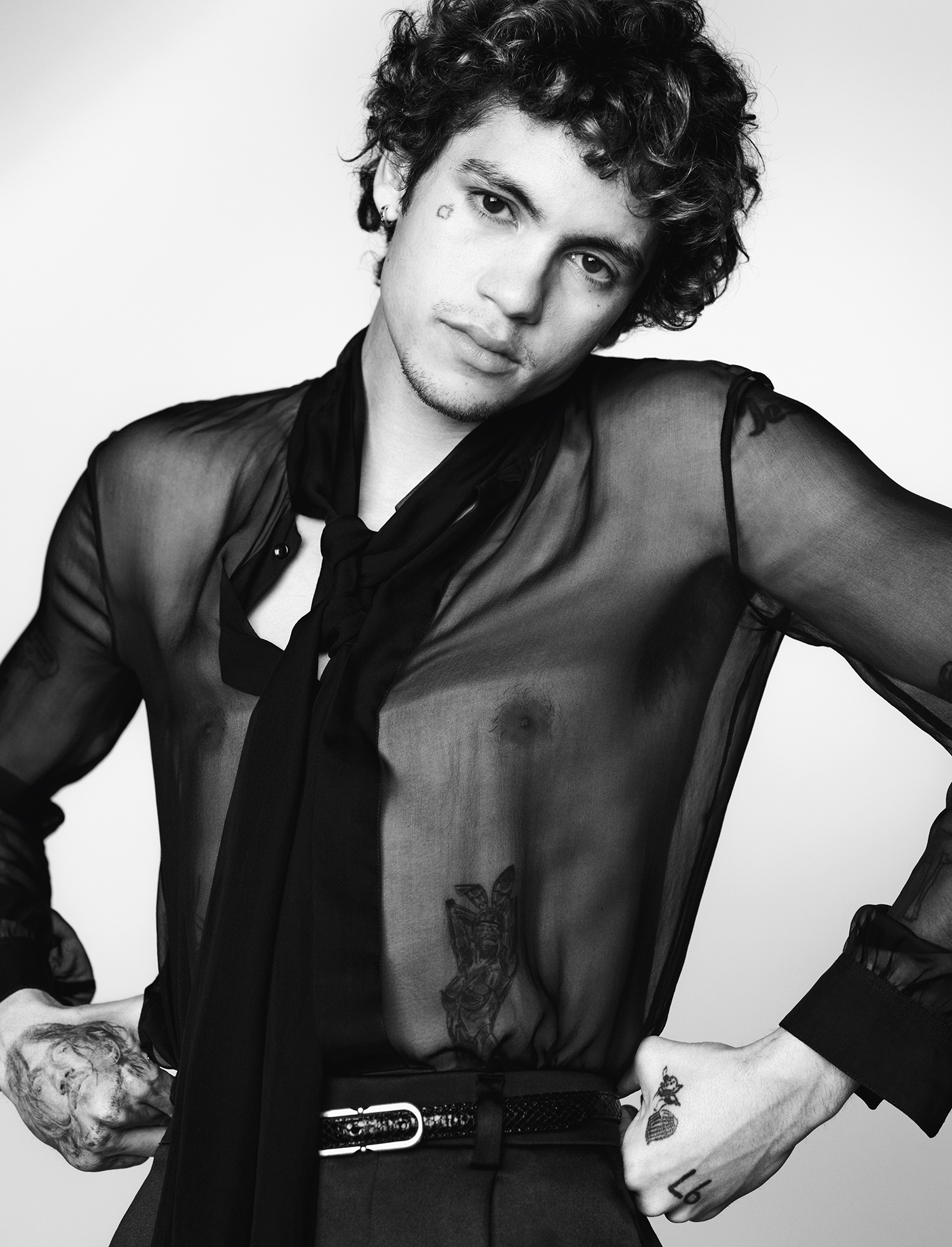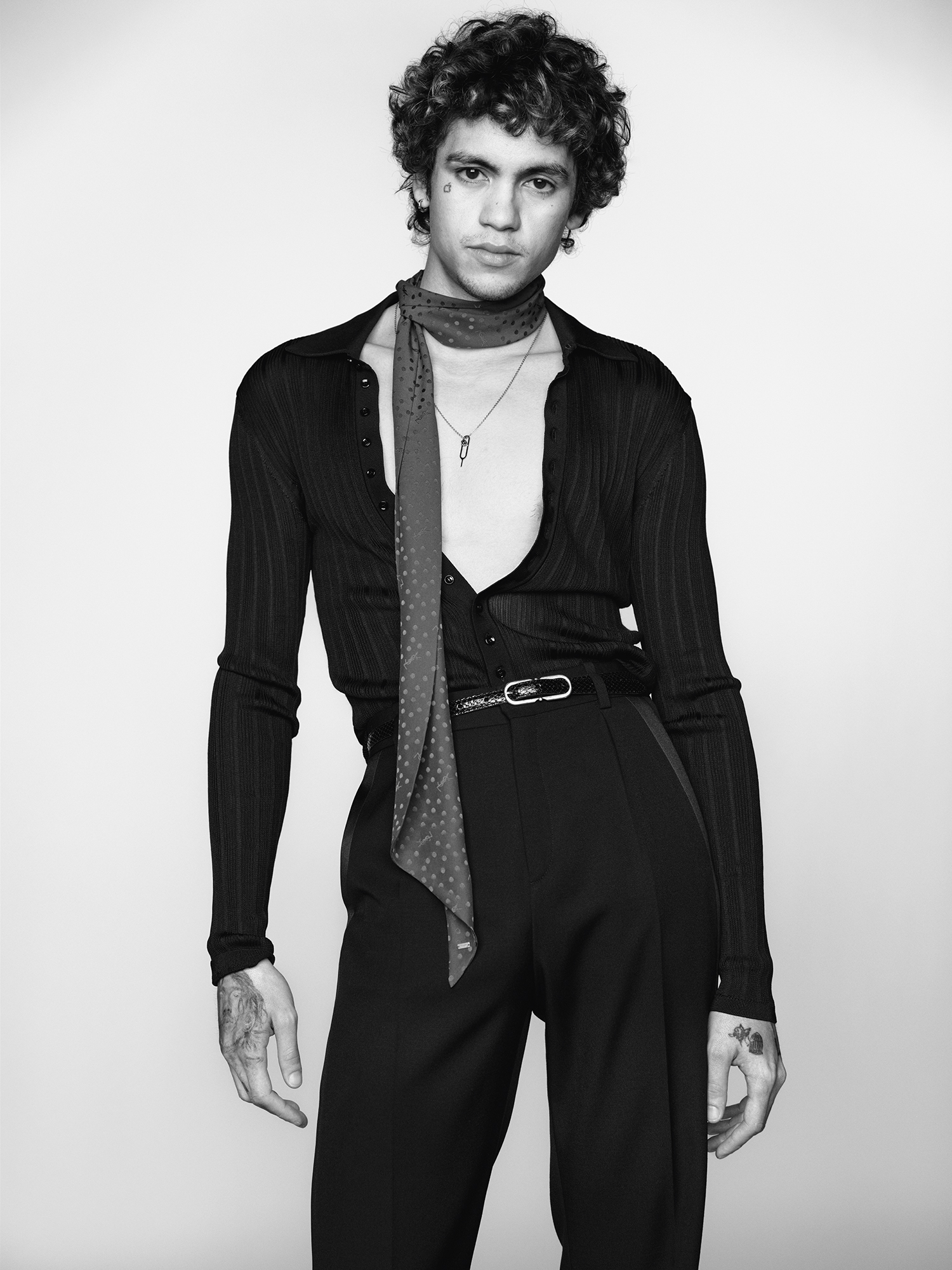This cover story appears in VMAN50, now available to order
Dominic Fike’s debut EP with Columbia Records was titled Don’t Forget About Me, Demos. Nearly five years later, in 2023, the world has certainly obliged his request—seemingly, Fike becomes less forgettable each day, further weaving himself into the worlds of music (he spent the last months of 2022 touring his most recent album, What Could Possibly Go Wrong), TV and film (he starred as Elliot in HBO’s massive hit Euphoria and has major acting projects ahead), and of course, fashion, wherein brands like Calvin Klein have tapped the 27-year-old to star in their omnipresent global campaigns. Now, Fike is virtually inextricable from our pop culture’s fabric.

Keeping in mind that he signed his record deal while on house arrest, his unimaginable success is all the more impressive. And while much of his previous music focused on his transition into the spotlight, Fike’s new music will revisit his past, which is of course, intricately tied to his present.
VMAN: How are you doing?
DOMINIC FIKE: I’m fantastic, man. I’m in Hawaii.
VMAN: What island are you on?
DF: I’m on the Big Island. I think it’s called Kona. I don’t really know though, because I’m not too familiar. I’ve been here for like a week.
VMAN: That sounds really nice! I want to start off by going back to the end of last year. Last year was a lot for you, especially with the tour. What was it like for you to be touring to that extent?
DF: It was great. I mean, I’ve toured a little bit. I’ve already done two or three tours at this point. I did a world tour in 2019, that was like three months long, and then I did a college festival tour recently, maybe last year. I’ve also done festival one-offs around the world for a little bit. I’ve toured quite a bit, so that really wasn’t too big of a lifestyle change, but it was kind of crazy, the amount of discipline I had to put in this time around. I stopped doing drugs and [indulging in] alcohol, so it was pretty much just work rather than partying.

VMAN: Wow, it sounds like a lot more work than anything else.
DF: It was, because I had a lot of people, it wasn’t just a skeleton crew, like in the 2019 world tour with maybe seven people. This time, it was two tour buses full of people. The whole stage design, production, crew and lights, and everything were a huge step up. So I couldn’t really afford to be screwing around. But it was a really good time. I’d never done anything like that, but it was cool. I stepped up to it.
VMAN: You were playing new music that you hadn’t officially released yet while you were touring. Why did you choose to share some songs that way and how was the reaction, in general?

DF: The reaction was great. I kind of chose to share songs that way cause I know it’s been a while since I’ve been able to release any new music for anybody. I feel like the last time I really got to interact with any fans was before Euphoria. I think a lot of this new fan base doesn’t really know who I am. I just kind of lost that connection between me and the people. Sometimes when I say crazy things on Twitter, people kind of look at me like, “Who the hell is this kid talking to?” You know? Because a lot of these people don’t even know who I am. So yeah, it feels good to talk to my fans through the music, and kind of keep directing the narrative of who I am. Sometimes I forget that I just gained this whole new fan base that didn’t evolve with me since my start in 2019. So a lot of these kids just have no idea who I am and that’s why I chose to play some of the unreleased music from the new album during the tour. That’s the best way that I know how to communicate with them. I’m not gonna sit on Instagram and say sorry for anything or talk to them on stage, I’d rather just play the music.
VMAN: Can you tell me more about that? Being on Euphoria obviously gave you a massive increase in visibility. How did that play into the music?
DF: It was really cool. Obviously, there are pros and cons to it. Some of the pros are, obviously, a lot more exposure, a lot more people to [listen] to my music. Being booked for music because of the increase in fan base and getting bigger deals with brands so I can make more music and try to spend more time in the studio and be less stressed so I can create. It did a lot for me, but I guess the con is when your fan base grows like that, kind of, overnight. A lot of kids have no idea who I am. I try to remember that they have to take the time to learn who I am as an artist…just like everyone else did back in 2019. So catching those kids up to speed hasn’t been the easiest thing because I’m not one of those people who is always online and in your face. The only way I really communicate with people is typically through music. And because I haven’t been releasing new music as often, that dialogue is kind of lost on these new fans. I feel partially responsible, but also I’m not rushing my music just to talk to everyone.

VMAN: It seems to me that it would be much smarter to have patience and communicate through music that you’ve spent time on, rather than posting a knee-jerk reaction to something on social media.
DF: Absolutely. I feel like I’ve had a couple of clashes with my new fan base and even my old one just because I’ve done a lot of growing and they haven’t really seen so much of it because I’m not online as much as other public figures. If I were to go online and give a statement or some long-winded Instagram story, or whatever people do, I’d probably butcher it. Talking to people through music is always the way I communicate. And for good reason.
VMAN: With your new music, what kind of themes do you find yourself visiting when writing lyrics?
DF: I feel like when I had released the project back in 2019, the demos were kind of just where I was at the time. I was in jail when I was writing Don’t Forget About Me, Demos, and the What Could Possibly Go Wrong album was about me coming to L.A. then being put in the public eye. I think for this new project, I’m just going back a little bit to my childhood and exploring things that have [shaped] me. My [body of work] has been covering my whole story and the new album is kind of the next [chapter]. It’s about the things that I’ve experienced. With music, for me, it’s always just about honesty, you know? I’m telling stories, but a lot of it comes from personal experience. This project is kind of just going back and it’s really honest. I just decided to be honest with people again, because I think everyone’s missing that in music at the moment.

VMAN: With these new larger audiences, do you find yourself debating more in terms of what you want to share with your music as opposed to what you might want to keep for yourself in terms of personal experiences?
DF: Yeah, absolutely. I think more so in the post-process, the selection. I think during the creation, I’m not too concerned about what anyone is thinking about or even the fans at all. I feel like they don’t even know what they want. In post-production, I’m more conscious about what to share, for sure. And not out of fear, I just feel like timing is everything. I feel good that I have the opportunities to decide what order these things are coming out and when I shed light on the subjects I choose.
VMAN: I wanted to ask about how you balance your acting career with music, but in addition to that, how do you also balance finding time for yourself? Because, obviously, you need more than just your job, so what would you say is your key to overall balance?

DF: Well, the only way I do balance those things is by being healthy, happy, and enjoying my life. I feel like balancing acting and music, for me at least, the only way I can do any of this is if I’m okay. So that’s why I’m sitting here in Hawaii right now, and I’m sober and I’m taking the time to work out every day. I want to pay attention to my body, and see what it needs both physically and mentally. There was some time that I went through where I just couldn’t work because I was so lost in these habits that I couldn’t make any music. People will think that I’m going away for three years to make an album, but half of it is just getting myself together and healthy. Then the other half is getting back to the music, you know? So the only way I can balance those things is by taking care of myself and enjoying life. I just made an album and turned it in, and then I was supposed to jump right into another one, but instead I decided to come here and take a little break, which feels like something that a lot of the people in LA do. I feel like they’re just like, “Oh yeah, I’m gonna go away for a second and decompress.” I always thought that was kind of a weak move because when I was coming up in Florida, we never had time to decompress. Like go ahead and get it, you know? But I understand that what we’re doing now is on a larger scale and it takes a lot more mental and physical energy out of you. So I have been taking the time to decompress.
VMAN: It’s very different, the kind of art you can make while you’re feeling happy and healthy physically.
DF: Oh my God. It’s a huge, huge difference.
This cover story appears in VMAN 50, now available to order
Photography Nathaniel Goldberg
Fashion Gro Curtis
Creative Director Stephen Gan
Grooming Anna Bernabe (The Wall Group)
Executive Producer Johnny Pascucci (Photobomb)
Senior producer Kevin Warner (Photobomb)
Production coordinator Merry Nestor
Digital technician Evan Strang
Photo assistants Roman Felix, Kevin Coey
Stylist assistants Mattie Tiggleman, Emma Oleck
Production assistants Paul Draper, Nick Lambrakis
Location Lightbox (Smashbox)
Discover More

